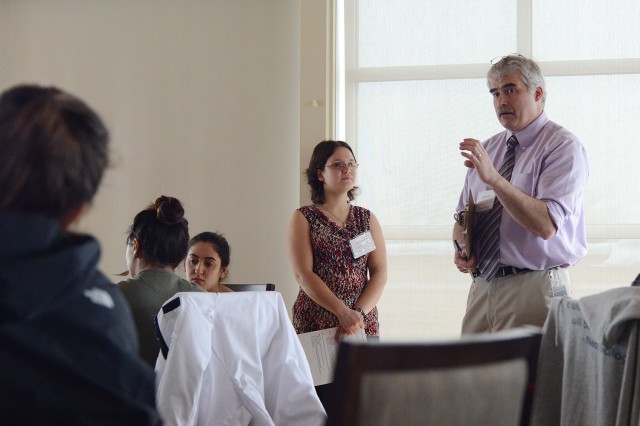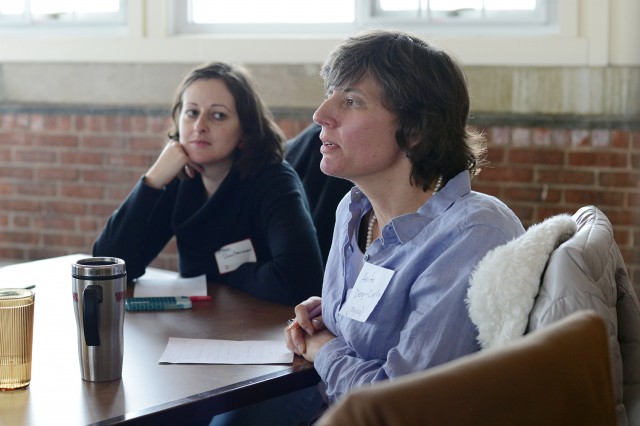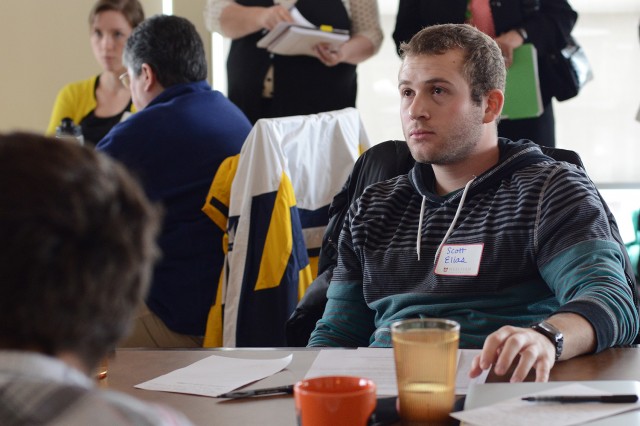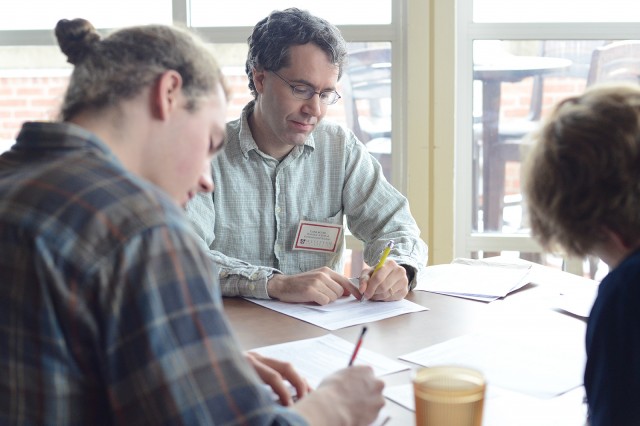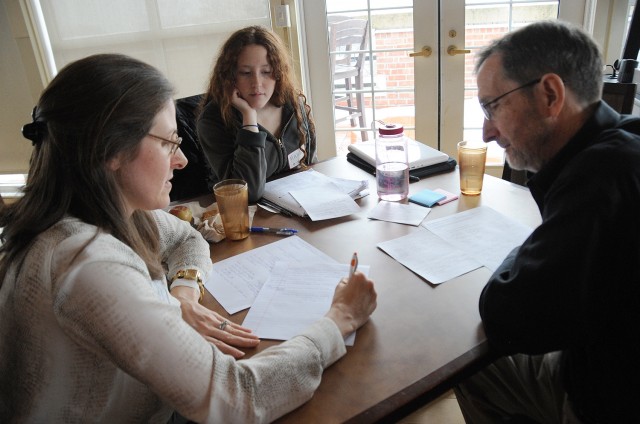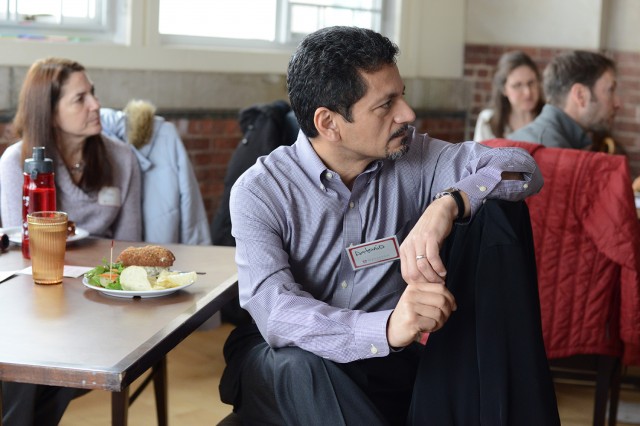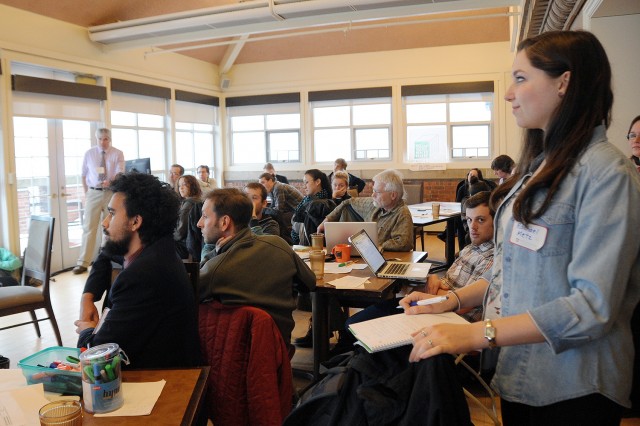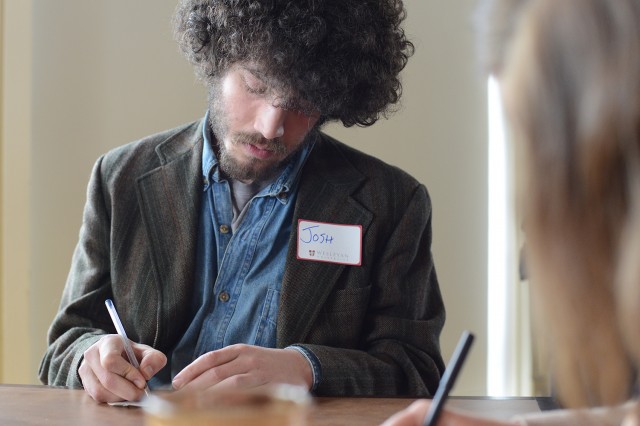Wesleyan Community Brainstorms Sustainability Ideas, Efforts at Workshop
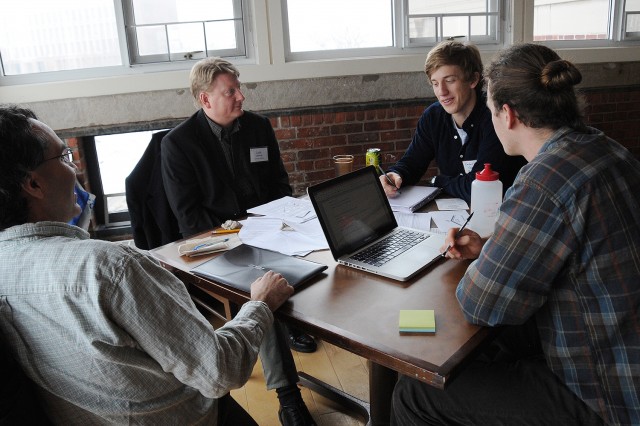
By 2050, the American College & University Presidents’ Climate Commitment is requiring that Wesleyan become carbon neutral. To meet this goal, the university needs to reduce its emissions 1,000 tons annually for the next 36 years — the equivalent of the carbon sequestered by 860 trees each year.
To help the university meet this goal, Wesleyan’s Sustainability Office and the Sustainability Advisory Group for Environmental Stewardship (SAGES) hosted a Sustainability Action Planning Workshop on Feb. 21. More than 50 faculty, administrators, staff and students gathered to brainstorm and develop creative new ideas for Wesleyan’s next Sustainability Action Plan.
“In order to meet this goal, we need to get started now,” said Bill Nelligan, director of environmental services. “Many of us only work inx or visit a small number of buildings or areas on campus, so we’re looking for input from the entire campus community.”
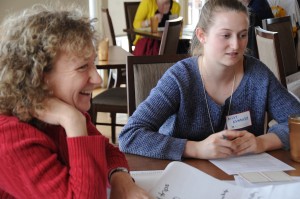
The five-hour event included an introduction by Wesleyan President Michael Roth, a brainstorming session, group idea development sessions and presentations.
Workshop attendees broke into groups to focus on areas of campus buildings; dining and food; diversity, inclusion and affordability; education and research; energy; community and campus engagement; grounds; health and well-being planning; purchasing; transportation; waste; and water.
Physics major Kiley Kennedy ’16 joined the health and wellbeing workgroup, which focused on connecting the ecological and environmental factors with physical and psychological health. The group brainstormed several ideas, and suggested Wesleyan offer integrated (faculty/staff/student) fitness classes; outdoor classrooms; extensive outdoor running trails/maps; an outdoor fitness center above the Central Power Plant; and for-credit outdoor physical education classes.
“The overall goal of these ideas are to give people who have a hard time getting active or feel confined to the gym better access to physical activity outside of the gym. There are also ways to encourage walking that might help with physical and psychological health and atmosphere,” Kennedy said. “We also discussed ways to engage with and integrate faculty, staff, students and the Middletown community through environmentally-focused activities and fundraisers.”
Anita Deeg-Carlin, administrative assistant in the Physics Department, participated in the engagement workgroup. Her group discussed ways to streamline the efforts of the 20-plus environmental student groups on campus, how to better communicate and collaborate between the groups and the Sustainability Office, and also how to identify, motivate, and support interested staff, faculty and community members.
“Our group concluded that the Sustainability Office needs to become more robust, with permanent staffing, and with better rewards for student volunteers, like credit/internships/paid positions, in order to become efficient and effective with our efforts toward sustainability,” she said.
Scott Elias ’14 participated in the energy workgroup and pressed for expanding the university’s solar capacity. Currently on Wesleyan’s Sustainability Tracking, Assessment, and Rating System (STARS) report, “Energy” received 4.33/16.50 and 0/7 in the “clean and renewable energy” subcategory.
“Our energy group explored ways to conserve energy, improve efficiency, encourage behavioral change, and increase the use of clean and renewable energy. In particular, it was suggested that Wesleyan invest in solar panels on senior housing, which is currently one of the least sustainable parts of campus,” he said.
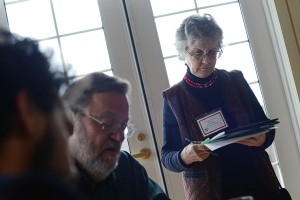
Krishna Winston, director of the Service Learning Center, the Marcus L. Taft professor of German Language and Literature, professor of environmental studies, participated in the education workgroup as a member of SAGES and chair of its education subcommittee. Her group focused on effecting behavioral change and “establishing the concepts and methodologies of sustainability so firmly in the curriculum that every student graduating from Wesleyan would understand the necessity of living sustainably and promoting sustainability in the economy and society,” she said. Winston also talked about ways to include faculty and staff in SAGES educational initiatives.
Sustainability Office intern Rachael Metz ’16 worked with members of the transportation workgroup. Her group discussed the idea of banning cars for first-year students on campus; creating an incentive for other students to not bring cars by providing reduced Zipcar rates; creating parking incentives for faculty and staff using hybrid or electric cars; switch out Public Safety vehicles with hybrid or electric cars and replace The Ride vans with sustainable vehicles, as technology advances.
“Though all of the attendees were told to think big without a budget, all of our ideas were short-term and could be accomplished in the next few years. Though I know that doesn’t hold true for all of the groups because of logistics, it is exciting that the transportation issues on campus could possibly be completely eliminated in the next few years in exchange for more sustainable options,” Metz said.
Liz Tinker, administrative assistant in the English Department, was part of the waste and dining-themed workgroup. Her group discussed dishware, composting and compost bin placement, limiting the amount of copy paper and posters. “I decided to attend the workshop after completing the Sustainability Survey on which I mentioned a number of issues I thought should be addressed. I felt that rather than just complaining about issues I should actively participate in trying to resolve them,” she said.
In March, the Sustainability Office will invite the campus to take part in the next step of creating its sustainability action plan, working in small groups to take the brainstormed ideas to the next level.
“So much energy was generated and harnessed during the workshop, we need to ‘ride the wave’ to good results,” Deeg-Carlin said. “The amount of creative, low-cost, ‘no-brainer,’ ideas that were generated was so refreshing and exciting; I look forward to getting the summaries of all the groups, continuing the conversations, and putting them into action.”
View more photos of the Sustainability Action Planning Workshop below:
